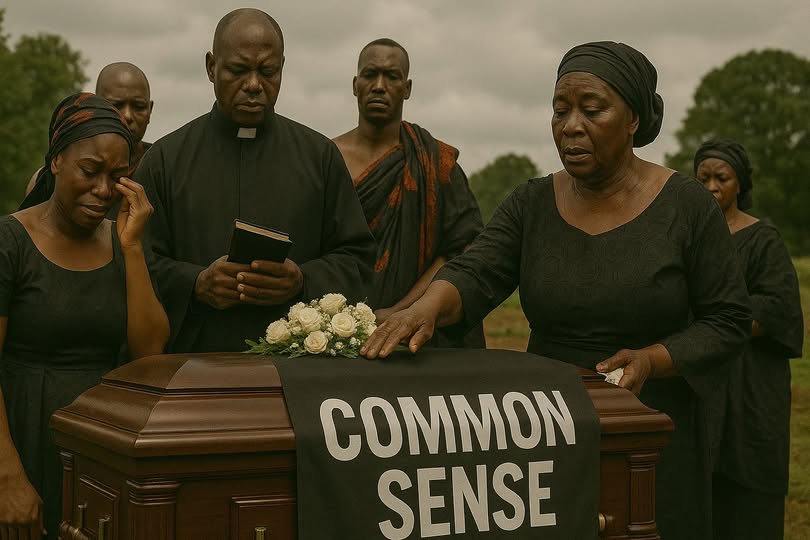Daddy Lumba Widow Lawsuit – The Final Mic Battle!
In the Republic of Uncommon Sense, even death now trends.
Here, funerals are not quiet farewells—they are festivals of fabric and feeling; a parade of lace and long speeches where grief is measured in decibels and the MC must be as skilled as the priest. And when the departed happens to be
Charles Kwadwo Fosu, better known as Daddy Lumba, the afterlife does not simply begin; it
premieres, complete with posters, programmes, and press conferences.
This storytelling satire examines the Daddy Lumba widow lawsuit—a saga where law, love, and legacy sing in discordant harmony.
Kumasi’s air is suddenly thick with nostalgia and legal tension. In one corner stands
Akosua Serwaa Fosuh, the wife with a German registry and a Ghanaian heart—married in 2004, far from the gaze of our town elders. She has returned not for a concert but for clarity, filing an injunction at the Kumasi High Court so the Maestro’s farewell does not become a family stage play without the law’s script.
Facing her, in the court of public memory, is Priscilla Ofori—our familiar
Odo Broni—the woman whose name sings like a chorus and whose presence in the latter pages of Lumba’s life was as open as daylight. She arrives without a registry but with what Ghana respects almost as much: companionship witnessed by neighbors, captured by cameras, and harmonized by gossip. If the registry is a stamp, the neighborhood is a seal.
Between these women stands a family navigating the tightrope between custom and court—the ever-patient
Abusua-Panin clearing his throat to say, “Let peace prevail,” just before announcing that the coffin colour requires further deliberation. The Baba Yara Stadium waits like a grand cathedral; the mortuary, like a courtroom annex. And somewhere in the silence, a guitar riff lingers, asking, “Who gets the final mic?”
🎶 The Daddy Lumba Widow Lawsuit: Where Love Meets Law
Once upon a Saturday night, Lumba taught us that love could be sung in two keys: laughter and longing.
His songs carried brides to the aisle and sent broken hearts back to the dance floor. But love—like history—has footnotes, and footnotes require lawyers. The
Daddy Lumba widow lawsuit is not just a case file; it is a cultural crossroad where the registry book faces the family stool, and both ask for the microphone.
The injunction, softly worded yet heavy as granite, whispers: “Do not collect the body.”
It is a request for dignity amid the drumroll—a pause button on a nation’s favourite soundtrack.
And still, the crowd leans forward: Was she the only wife? Was she the last wife? Does the law care about timing, or just about papers?
⚖️ Courtroom Meets Coffin
Our ancestors buried with drumming and dancing; we bury with affidavits and hashtags.
The mortuary now checks WhatsApp before releasing a body—“Is it under injunction or refrigeration?”—and the MC at the funeral must rehearse both the tribute and the court’s order, just in case. In the Republic, even the hearse must obey the docket.
💋 Odo Broni & the Phantom Vows
Ah, Odo Broni—whose very name is melody and mischief. She offers not a certificate but a story, not a registry but a rhythm: breakfasts shared, shows attended, visitors received, a life lived in the bright sun of familiarity.
Akosua Serwaa counters with the state seal; Odo Broni counters with the town square. One speaks in law, the other in lore. Both speak of love.
🏠 Family Meetings & Other Endurance Sports
Every Ghanaian funeral is a decathlon of decisions: pew positions, cloth shades, who pours libation, who reads the tribute, who sits in the widow’s chair.
Here the Fosu family competes for calm as relatives propose and oppose in equal measure. Minutes are typed like epics. And after “Let peace prevail,” someone remembers we still haven’t settled the font on the obituary poster.
💰 Legacy, Money & the Price of Memory
We should not pretend this is only romantic. Where there is legacy, there is ledger.
Lumba’s catalogue will sing long after the last wreath fades. Estates have a way of turning relatives into historians and fans into auditors.
The true test of a nation’s love is not in tribute songs, but in how gently we handle the things the dead leave behind.
💻 Netizens: The New Funeral Commentators
Online, the jury never adjourns. “Let the man rest,” they plead, right after sharing another flyer.
“Eii, even in death he’s trending,” they laugh, while composing a thread. Meme-makers are tireless: Lumba’s ghost with a microphone announcing the next track—Love in Court Minor.
The hashtags do their work: #DaddyLumbaWidowLawsuit #FinalMicBattle #RestInPeaceButFileAppeal.
🕊️ The Moral of the Melody
Love in Ghana is sung in stereo but buried in mono. We trust both family and court, yet ask them to dance to different tempos.
Perhaps the lesson of this lawsuit is simple: let the living argue and the law decide, but let the dead rest.
The Maestro gave us a library of feelings; the least we can give him is silence after the last note.
Because when the grave becomes a courtroom, even angels begin to charge appearance fees.
For another laugh from the Republic’s archives, visit our feature
Heat Stroke in Suits: The True Price of Professionalism
.

📘 Once Upon a Time in Ghana — Satirical Chronicles
Love our satire? Grab the book that started the movement and support the Republic.
Get it on Amazon →
Share your verdict:
Who should have the final mic at Daddy’s burial—the law, the family, or the legend himself?
Share this post on Facebook, X, and WhatsApp, and tag a friend who knows all the Lumba lyrics but none of the court procedures.
Disclaimer: This is a satire/opinion piece based on ongoing public discourse.
For factual updates on legal proceedings, consult primary reports and court records.
Affiliate links appear above.










